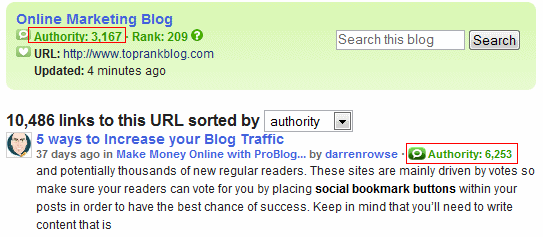Can blogs be optimized for search marketing? Absolutely! Blogs are basically content management systems with additional functionality such as comments, trackbacks and RSS. In many ways, blogs are no different than web sites.
If a document can be optimized and that document gets indexed, categorized and ranked by any kind of search engine, it’s an opportunity for search marketing. As such, marketers should be aware of how document optimization within various channels can be used within the overall online marketing mix. Blogs are one of many platforms that benefit from optimization.
At a minimum, using blog software to manage certain kinds of content on a web site such as an online media room, to archive newsletters, post frequently asked questions and to provide product updates can make a site that is otherwise very search engine un-friendly, become a viable source of great rankings. This applies to both regular search engines as well as blog search engines. These are applications for a blog besides the common use as a platform to increase credibility and communicate a more personalized voice for a company.
Blogs are no silver bullet though and require working hard and smart – especially smart. However the payoff can be significant. To prove the point that blogs are effective tools for improving search engine visibility, I can offer that my own blog (Online Marketing Blog) receives the majority of it’s traffic from search engines.
Here are a few Google ranking examples of the top referring search phrases in the past month for Online Marketing Blog:
Even more niche phrases bring in quality search traffic such as:
which are all services our search marketing agency provides. Of course the rules can change slightly over time, but here are a set of benefits I often find myself explaining to people wondering about the search engine optimization benefits of having a blog.
- Structured content – Blog software with category features allows the aggregation of content according to themes. This makes it easier to algorithmically categorize content. If you can make it easier for search engines to understand your content, you have a much better chance of ranking well on those topics.
- Crawlable URLs – Most blog software offers uncomplicated URL structure, making it fairly easy for search engine spiders to find and crawl blog content.
- Internal links – Blogs that post product or service related information can deep link anchor text to product information or purchase pages deep within the web site. This is very beneficial for ranking on long tail phrases.
- Inbound link magnet – One of the biggest benefits, blogs link freely to each other – much more than web sites do. Blogs are also a significant source of many posts to social news and social media web sites. Text, audio and video are all easily supported for syndication by blogs. The more media available, the more likely it will attract incoming links. Additionally, there are many widgets and plugins that make it easy to share blog content, thus encouraging links and traffic.
- RSS – Links to RSS feed urls that use the blog domain name will assist in building link popularity and when RSS content is syndicated or cited by other blogs, any embedded links will also assist in sending traffic.
- Fresh content – Both readers and search engines reward fresh content with repeat visits. From a search engine perspective, that means your site can be crawled more frequently, allowing your new content to become searchable more quickly. Fresh content is also indicative of a more authoritative web site.
- Active community – Comments and trackback features in blog software encourage interaction. An active blog community creates the kinds of citations or signals from other sites (annotated and contextually relevant links) that search engines tend to reward in the rankings. Loyal blog readers can boost a site’s visibility through advocacy on other blogs, in forums offline at conferences as well as on their own blogs and within the comments of your blog.
- Non-Search traffic – I think the greatest benefit of having an active blog has little to do with improving your search engine rankings though. The best thing about blogs is that they allow you to generate substantial amounts of traffic via RSS and links that have NOTHING to do with search engines. My recommendation to marketers in 2007 is to pursue traffic alternatives to search engines as aggresively as their budgets and marketing programs will allow. The result will be incremental increases in site traffic with search engine referred traffic an added bonus, if not correspondingly enhanced.
- Blog & RSS Directories – With a blog and corresponding RSS feed(s), your site can now benefit from visibility within blog and RSS search engines. Web sites without feeds (your competition maybe?) are not included in these kinds of directories and search engines.
Felllow BBC’er Stephan Spencer has also written extensively about optimizing blogs and using blogs as SEO tools.
So there you go. A basic list of practical reasons a blog can be beneficial as a site optimization tool and for improved web site traffic along with practical examples. What SEO benefits have you found from having and promoted a blog?











